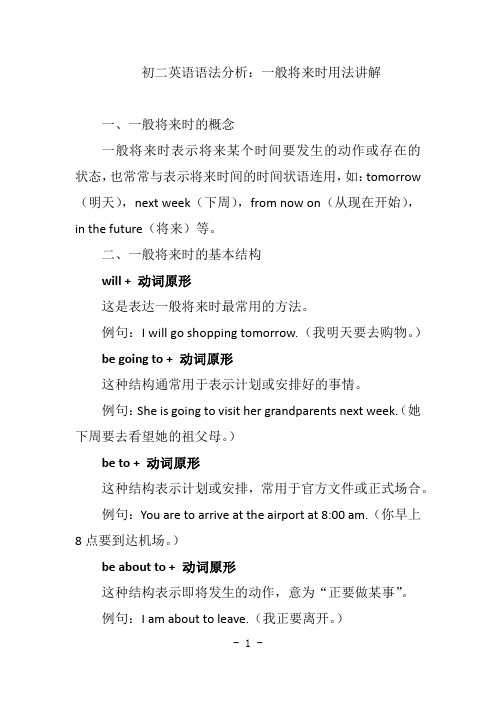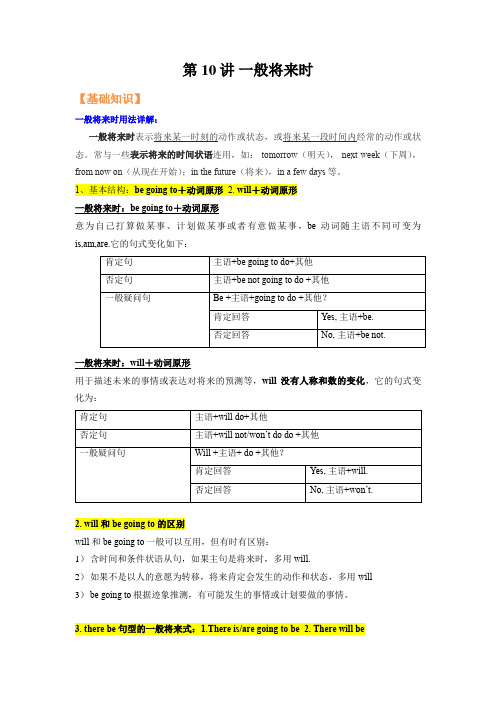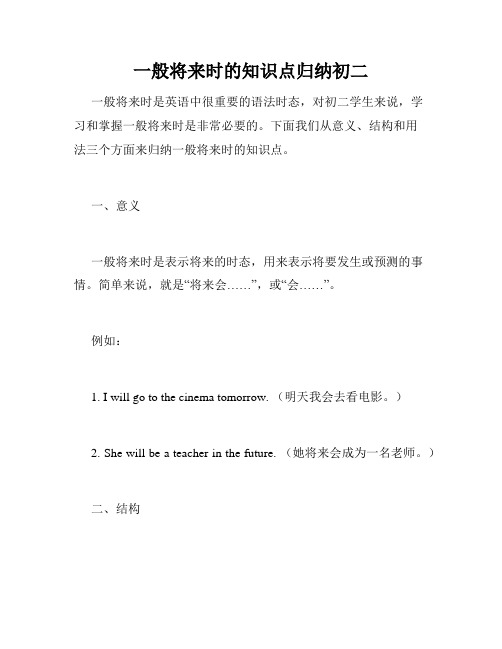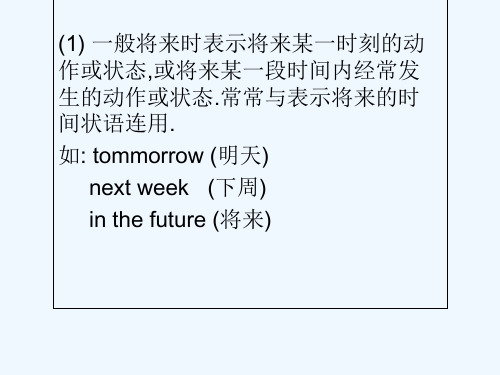英语人教版八年级下册一般将来时
人教版八年级下册英语unit1语法(一般将来时)

事物作主语时,以人为主语时有时也可以这样用:
a.The plane takes off in ten minutes. Tomorrow is Sunday.
b.They have no classes tomorrow. I’m not at home tonight. 注:在时间及条件从句中代替一般将来时,或用在hope后的宾 语从句中: a.Give me a ring before you leave. When she comes,I’ll tell her about it. b.I hope she gets back in time. We hope you are well.
即将发生某事 It’s going to rain soon.
②现在进行时表将来
My brother is having a party tomorrow. When are you leaving? -----At the end of the term.
③一般现在时表示按计划要发生的事,特别是以
e.表示同意:
Don’t be late.--- No,I won’t. Will you answer him? ---- Yes,I will.
③使用shall的一些情况
A.shall主要用于第一人称后,构成疑问句,询问对方意见:
What time shall I come? Where shall we go for our holiday? Shall I do the washing up? Let’s go, shall we? What shall we do this weekend? B.shall也可用在陈述句中(但现在口语中这样说的人比较少了,一般 多用will) We shall(will)be in touch.
初中八年级英语下册一般将来时的表达课件

How can we express the Simple Future Tense
Ⅱ.一般将来时的五种表达方式:
3. be doing sth 表将来 现在进行时表示即将发生的动作,多与表示位移的动词come, go, arrive, leave fly, start等连用。 如: She is leaving for Beijing.(她就要启程去北京。leave for启程,动身)
1.当表示主观方面“打算, 准备” 去做什么事情的时候, 往往用be going to +动词原形, 而will 则多用来表示纯属客观的将来。
2.be going to+动词原形可表示事先计划的意图,而 will 则表示说话人当时决定的意图。
How can we express the Simple Future Tense Do some exercises
一般将来时的结构总结 Ⅲ.There be 句型的一般将来时:
2. There will be
肯定式: There will be+sth.
否定式: There will not be+sth.
一般疑问式: ——Will there be+sth?
(肯)——Yes, there will.
(否)——No, there will not.
–________ (好的). Yes, please B.Yes, you will.C.No, please.D.No, you won’t. 4.– Will his parents go to see the Terra Cotta Warriors tomorrow?
– No, ________ (不去). A.they willn’t.B.they won’t.C.they aren’t.D.they don’t.
八年级一般将来时知识点

八年级一般将来时知识点一、一般将来时的概念一般将来时(Simple Future Tense)是指在现在或将来某一时间发生的动作或状态。
它表示将来的事情或者打算、意图、承诺、预测等含义。
在句子中通常用will或shall加动词原形来表示。
例如:1. I will go to the cinema tonight. 今晚我要去电影院。
2. She will be a doctor when she grows up. 她长大后要成为一名医生。
二、will和shall的用法1. 表示意愿、决心等。
例如:I will help you with your homework.我会帮你做作业。
2. 表示承诺或提议等用法。
例如:I shall be there on time.我会准时到那儿。
Shall we go to the park tomorrow?我们明天去公园好吗?3. 在口语中,will常用于表示将来事件。
例如:It will rain tomorrow.明天会下雨。
4. shall在现代英语中已经不常用,一般只在特殊疑问句或回答中使用。
例如:Shall I open the window?我该打开窗户吗?Yes, you shall.是的,你该打开。
三、构成方法形式:will / shall + 动词原形例如:I will go to Paris next month. 下个月我要去巴黎。
He shall be here soon. 他马上就要来了。
注意:一般将来时中,主语部分要与will或shall连用,不可以出现be动词或助动词do/does/did等。
四、常用的表示将来的时间状语1. tomorrow 明天例如:She will be back tomorrow. 她明天回来。
2. next week/month/year 下周/月/年例如:We will visit them next month. 我们下个月去探望他们。
初二英语语法分析--一般将来时用法讲解

初二英语语法分析:一般将来时用法讲解一、一般将来时的概念一般将来时表示将来某个时间要发生的动作或存在的状态,也常常与表示将来时间的时间状语连用,如:tomorrow (明天),next week(下周),from now on(从现在开始),in the future(将来)等。
二、一般将来时的基本结构will + 动词原形这是表达一般将来时最常用的方法。
例句:I will go shopping tomorrow.(我明天要去购物。
)be going to + 动词原形这种结构通常用于表示计划或安排好的事情。
例句:She is going to visit her grandparents next week.(她下周要去看望她的祖父母。
)be to + 动词原形这种结构表示计划或安排,常用于官方文件或正式场合。
例句:You are to arrive at the airport at 8:00 am.(你早上8点要到达机场。
)be about to + 动词原形这种结构表示即将发生的动作,意为“正要做某事”。
例句:I am about to leave.(我正要离开。
)be due to + 动词原形这种结构表示某事预定或预期将要发生。
例句:The train is due to arrive at 5:00 pm.(火车预定下午5点到达。
)三、一般将来时的用法1表示将来的动作或状态例句:I will buy a new car next year.(明年我要买一辆新车。
)2表示将来的计划或安排例句:We are going to have a picnic this weekend.(我们这个周末要去野餐。
)3表示根据现有情况推测未来的可能性例句:It's going to rain soon.(很快就要下雨了。
)4表示命令、请求、建议等例句:You are to finish your homework before you go out.(你出去之前要把作业做完。
英语人教版八年级下册一般将来时

The Simple Future TenseUse the Simple Future Tense and the given words to make dialoguesA: What is she going to do tonight?B: She is going to look after/take care of the baby.A: What is the man going to do this afternoon?B: He is going to do some exercise.A: What is the boy going to do this weekend?B: He is going to play basketball.A: What are they going to do in two months?B: They are going to marry.Fill in the blanksThey ______ have a picnic.He _________ fish.The girl _____ draw a picture.The girl _____ run.Two students __________ play chess.Make sentencesread a book tomorrowShe will read a book tomorrow.do her homework on Saturday morningShe will do her homework on Saturday morning.the next day have a birthday partyShe will have a birthday party the next day.play football tomorrow morningThey will play football tomorrow morning.一般将来时两种基本句式的区别:在初中阶段来讲,”be going to+动词原形”和“will+动词原形”这两种表示将来时态的结构没什么区别。
人教版八年级下册英语3个重要时态!

人教版八年级下册英语3个重要时态!一,重点语法:一般将来时一般将来时态的应用do/does 的一般将来时态形式:(shall/will) dodo/does 的一般将来时态的被动语态:(shall/will) be done一般将来时态的肯定句、否定句、疑问句形式:肯定句例句:People will have robots in a few years.否定句例句:People (will not/won't) have robots in a few years.一般疑问句例句:Will people have robots in a few years?特殊疑问句例句:What will people have in a few years?二,重点语法:过去将来时过去将来时的结构:should/would+动词原形do/does 的过去将来时态形式:(should/would) dodo/does的过去将来时态的被动语态:(should/would) be done过去将来时态的肯定句、否定句、疑问句形式:肯定句例句:You should write a letter to him.否定句例句:You shouldn't write a letter to him.一般疑问句例句:Should I write a letter to him?特殊疑问句例句:What should I do?三,重点语法三:过去进行时do/does 的过去进行时态形式:(was/were) doingdo/does 的过去进行时态的被动语态:(was/were) being done过去将来时态的肯定句、否定句和疑问句形式:肯定句例句:I was walking down the street when a UFO landed.否定句例句:I wasn't walking down the street when a UFO landed.一般疑问句例句:Were you walking down the street when a UFO landed?特殊疑问句例句:What were you doing when a UFO landed?动词 when 和 while 的选择:when 后加瞬间动词,while 后加延续性动词。
人教版新八年级英语暑假讲义第10讲一般将来时-(学生版+解析)

第10讲一般将来时【基础知识】一般将来时用法详解:一般将来时表示将来某一时刻的动作或状态,或将来某一段时间内经常的动作或状态。
常与一些表示将来的时间状语连用,如: tomorrow(明天), next week(下周),from now on(从现在开始);in the future(将来),in a few days等。
1、基本结构:be going to+动词原形 2. will+动词原形一般将来时:be going to+动词原形意为自己打算做某事、计划做某事或者有意做某事,be 动词随主语不同可变为is,am,are.它的句式变化如下:一般将来时:will+动词原形用于描述未来的事情或表达对将来的预测等,will没有人称和数的变化,它的句式变化为:2. will 和be going to 的区别will 和be going to一般可以互用,但有时有区别:1)含时间和条件状语从句,如果主句是将来时,多用will.2)如果不是以人的意愿为转移,将来肯定会发生的动作和状态,多用will3)be going to根据迹象推测,有可能发生的事情或计划要做的事情。
3. there be 句型的一般将来式:1.There is/are going to be 2. There will be它的句式变化为:例1. I don’t know if it ________ tomorrow. If it ________, I won’t go.A.will rain; rains B.will rain; will rain C.rains; rains D.rains; will rain例2.My class ________ the Summer Palace next Sunday.A.visit B.visited C.have visited D.are going to visit例3.Mike and Claire are very excited because they ________ to the US in a few days. A.move back B.moved back C.were moving back D.will move back例4.There ________ a talk by two astronauts tomorrow in our school.A.will have B.is going to have C.will be【真题演练】5. John is waiting for me. We ________ to the bookstore together.A.went B.have gone C.will go D.were going 6.We hope ________ a computer on every student’s desk in the future.A.there is B.there was C.there will be D.there has been 7. How time flies! I ________ a senior high school this September.A.enter B.entered C.will enter D.have entered 8.—Lydia, have you decided which city to travel to, London or New York?—Not yet. Maybe I ________ London to meet my friends this time.A.visit B.visited C.will visit D.was visiting 9. Don’t leave your toys on the table, or I ________ them away.A.threw B.will throw C.have thrown D.was throwing10.—What are you saving money for?—Father’s Day is around the corner. I ________ a gift for my father.A.am going to buy B.have bought C.bought D.was buying11. In the future, vocational(职业的)students _______ it easier to get jobs.A.found B.have found C.will find12. I ________ a party next Saturday. I hope you can come.A.had B.was having C.have had D.will have 13.—What are you going to do in the summer vacation?—I ________ a volunteer in the hospital.A.was B.am C.will be【过关检测】14.(2023·广东·深圳市高级中学八年级期中)—Betty, do you know if Tony ________ to the party next week?—I think he will come if he ________ time.A.will come; has B.comes; will have C.will come; will have 15.(2023·北京市陈经纶中学分校八年级期中)—What will you do this weekend?—I ________ some friends to my home.A.will invite B.invited C.invite D.have invited 16.(2023·河北·怀安县教育体育和科学技术局教育科学研究室八年级期末)Susan and her sister ________ some photos in the park the day after tomorrow.A.take B.took C.will take D.takes17.—________ a tall teaching building in our school in the future?—I am not sure.A.Will there be B.Will there is C.Will there have D.Will there has 18.In the past five years, China has done a lot in overcoming poverty(脱贫攻坚). In the next three years, it is believed that we ________ the poverty problem.A.have solved B.will solve C.solved D.solve 19.(2023·江苏徐州·八年级期中)He ________ here if he ________ enough time.A.will come; will have B.comes; will have C.will come; hasD.comes; has20.—Would you like to go hiking if it ________ fine this Saturday?—I’ d love to. But nobody knows if it ________.A.is; rains B.is; will rain C.will be; will rain 21.(2023·福建省福州民族中学八年级期中)If you start early, you ________ enough time tomake a better project(项目).A.have B.will have C.had22.(2023·重庆市合川中学八年级期中)—I can’t go to bed so early tonight. I have to study for my math test.—If you __________ up too late, you __________ sleepy during the test.A.will stay, will feel B.will stay, feelC.will be, feel D.stay, will feel23.(2023·福建省大田县教师进修学校八年级期中)If you ______ out all the candies in one go, the wish ______ true.A.will blow; will come B.blow; will come C.blow, comes 24.(2023·北京十八中八年级期中)Robots all the heavy and difficult jobs in the future. A.do B.did C.are doing D.will do 25.(2023·北京海淀·八年级期中)Jack ______ a good rest as soon as he finishes the exam. A.has B.had C.is having D.will have二、用所给单词的正确形式填空26.(2023·山东·巨野县教学研究中心八年级期中)If he comes tonight, we _______ (go) to the theater together.27.(2023·全国·八年级期中)They ________(book)the tickets to Beijing online tonight, aren’t they?28.(2023·江苏徐州·八年级期中)I think you ________ (feel) happy if you go and join them. They are going camping.29.(2023·全国·八年级期中)I’m sure Dad _____ (buy) me some presents when he comes back from Beijing.30.(2023·江苏·南京玄武外国语学校八年级期中)He _____(come)back soon. Don’t worry about him.31.(2023·江苏·南京外国语学校八年级期中)I think you ________ (feel) happy if you go and join them.32.(2023·江苏·江阴市教师发展中心八年级期中)I believe the publishing house_________(publish) this book at the end of this month.33.(2023·湖南·宁远县教研室八年级期末)I _______ (wait) for you in front of the cinema tomorrow.34.(2023·甘肃·天水市麦积区教学研究室八年级期末)We ________ (pick) apples on the farm tomorrow.35.(2023·内蒙古·四子王旗教育局教研室八年级期末)I ________ (give) the note to him as soon as school is over.第10讲一般将来时【基础知识】一般将来时用法详解:一般将来时表示将来某一时刻的动作或状态,或将来某一段时间内经常的动作或状态。
人教版英语八年级下册一般将来时

2. When we think or believe something about the future. (Prediction) • I think it will rain later so take an umbrella with you.
3. To make an offer, a promise or a threat. • I'll take you to the movies if you'd like.
Hale Waihona Puke TASK 4 – make a “to do” list for your weekends
5. Do you want to have the pasta or the pizza? I think (will / am going to) have the pasta.
6. What are your plans for Friday night? We (will / are going to) invite some people over for dinner.
人教版 新目标 八年级下 语法 一般将来时

句型转换 (画线提问) 1.I am going to water the flowers. do? What are you going to 2.She’s going to jump now. do? What is she going to 3.The boys are going to play cards. What are the boysgoing to do? 4.He is doing his homework. What is he going to do?
A 现在进行时可以表示对最近的 将来的确定的安排: I’m taking an exam in October. Bob and Bill are meeting tonight.鲍勃和比尔今晚要会面。
这句意指鲍勃和比尔已作了会面的 安排。如仅仅表示意图,则要用be going to形式。
我将在10月份参加考试.(我报名了)。
is/am/are 构成: going to + V 表示将要发生的事或打算、 定义: 计划、决定要做的事.
The Simple Future tense 一般将来时态
1. 时间状语 tomorrow… next week… in two hours ; from now on (从现在开始); in the future(将来); someday (未来的某一天)等。
一般将来时态 句型的转换
句型转换 (否定句) 1.I am not going to watering the flowers. 2.She’s not going to jump.
3.The boys arenotplaying cards. 4.He is not doing homework. his
人教版八年级下册英语知识点 (2)

人教版八年级下册英语知识点1. 时态英语中有多种时态,包括一般现在时、一般过去时、一般将来时、现在进行时、过去进行时、过去将来时等。
掌握时态的正确使用可以帮助我们表达过去、现在和将来的动作和状态。
1.1 一般现在时(Simple Present Tense)表示经常性的、习惯性的动作或真理。
示例: - I go to school by bus. - The sun rises in the east.1.2 一般过去时(Simple Past Tense)表示过去发生的动作或存在的状态。
示例: - I walked to school yesterday. - She was a doctor before she retired.1.3 一般将来时(Simple Future Tense)表示将要发生的动作或存在的状态。
示例: - I will go to the park tomorrow. - They are going to visit China next year.1.4 现在进行时(Present Continuous Tense)表示现在正在进行的动作。
示例: - I am studying for the exam. - She is cooking dinner right now.1.5 过去进行时(Past Continuous Tense)表示过去某个时刻正在进行的动作。
示例: - I was watching TV when he called. - They were playing soccer at 3 o’clock yesterday afternoon.1.6 过去将来时(Future in the Past)表示在过去某个时间点将要发生的动作。
示例: - He said he would help us with the project. - She told me she was going to visit her grandmother.2. 语法规则英语中有一些常用的语法规则,包括动词的时态和语态、名词的数和所有格、形容词和副词的比较等。
一般将来时的知识点归纳初二

一般将来时的知识点归纳初二一般将来时是英语中很重要的语法时态,对初二学生来说,学习和掌握一般将来时是非常必要的。
下面我们从意义、结构和用法三个方面来归纳一般将来时的知识点。
一、意义一般将来时是表示将来的时态,用来表示将要发生或预测的事情。
简单来说,就是“将来会……”,或“会……”。
例如:1. I will go to the cinema tomorrow. (明天我会去看电影。
)2. She will be a teacher in the future. (她将来会成为一名老师。
)二、结构一般将来时的结构非常简单,只需要加上助动词“will”,然后加上动词的原形即可。
例如:I will study English at university.(我将会在大学里学英语。
)但是,动词“be”在将来时的形式是“will be”,比如:I will be happy. (我将会很开心。
)三、用法1. 表示将来发生的动作或事件例如:I will go to the party tonight. (今晚我会去参加派对。
)2. 表示将来的打算或意图例如:I will write a novel next year. (我明年打算写一本小说。
)3. 表示推测或预测例如:It will snow tomorrow. (明天会下雪。
)4. 表示请求例如:Will you help me with my homework, please? (请你帮帮我做作业好吗?)总之,初二学生需要掌握一般将来时,以便准确表达自己的想法和意图,也能听懂别人的语言表达。
同时,需要注意时态的正确运用,避免错误的表达和误解。
能够熟练掌握和灵活运用一般将来时,一定会为日后的英语学习打下坚实的基础。
初二英语一般将来时讲解及练习

初二英语一般将来时讲解及练习讲解一般将来时表示将来某个时间或某个动作或状态一定会发生或存在的情况。
在英语中,一般将来时的构成主要有两种形式:will/shall + 动词原形和be going to + 动词原形。
will/shall + 动词原形will/shall + 动词原形是一般将来时的最基本形式。
其中,will通常用于第一人称,shall通常用于第二和第三人称。
例如:I will go to the party tomorrow.(我明天去参加聚会。
)He will finish his homework after dinner.(他晚饭后完成他的作业。
)They will have a picnic in the park next weekend.(他们下周末在公园野餐。
)be going to + 动词原形be going to + 动词原形表示将要发生或存在的事情,通常用于未来的计划、意图或打算。
例如:I am going to study abroad next year.(我明年要去留学。
)She is going to visit her grandparents this weekend.(她这个周末要去看她的祖父母。
)We are going to have a meeting next week.(我们下周要开会。
)注意:在使用be going to + 动词原形时,要注意主语和be动词之间的一致性。
例如:He is going to play football.(他将要去踢足球。
)而不能说:He are going to play football.练习题一、用一般将来时填空I (visit) my grandparents next weekend.They (have) a party next Saturday.He (be) a doctor when he grows up.We (travel) to Europe next summer.She (write) a novel someday.They (move) to a new house next month.I (study) hard so I can get into a good college. He (play) the piano at the concert next week. We (have) a meeting tomorrow morning. She (graduate) from high school in two years.二、将下列句子变为一般将来时I study English every day. _She teaches math at the high school.They are going to the movies tonight.He likes to read books in his free time. ___ We have dinner at six o'clock every evening. _ The train arrives at 8:00 in the morning. __ She sings in the choir on Sundays.They play soccer after school. ___He works at a restaurant on weekends. ____ We visit our grandparents once a month. __ 三、用一般将来时完成下列对话A: What are you going to do this weekend? B: I'm going to visit my grandparents.A: That sounds nice. Where do they live?B: They live in the countryside.A: What are you going to do there?B: We're going to have a picnic and go fishing.A: That sounds like fun. Are you going with your parents?B: Yes, my parents and my younger brother are coming too.A: Have a great time!B: Thank you, we will!四、阅读理解My Future PlansMy name is Jack and I'm a sophomore in high school. I have a lot of plans for my future. First of all, I want to go to a good college and study business. I have always been interested in business and I think I would be good at it. After graduation, I plan to start my own business.I want to own a restaurant that serves healthy and delicious food.In order to achieve my goals, I need to work hard in school and get good grades. I also need to learn about managing money and running a business. I have been studying these topics on my own and I plan to take some courses in college.I know it won't be easy, but I'm determined to succeed. I believe that if I work hard and stay focused, I can achieve anything I want.What does Jack want to study in college?What does Jack plan to do after graduation?What kind of restaurant does Jack want to own?What does Jack need to do in order to achieve his goals?What does Jack believe?答案:Jack wants to study business in college.Jack plans to start his own business after graduation.Jack wants to own a restaurant that serves healthy and delicious food.Jack needs to work hard in school, get good grades, learn about managing money and running a business, and take courses in college.Jack believes that if he works hard and stays focused, he can achieve anything he wants.。
英语人教版八年级下册一般将来时

?3begoingto动词原形用来表示近期或事先考虑过的将要发生的动作以及已有迹象表明必将发生某事意为打算
(1) 一般将来时表示将来某一时刻的动 作或状态,或将来某一段时间内经常发 生的作或状态.常常与表示将来的时 间状语连用. 如: tommorrow (明天) next week (下周) in the future (将来)
(4)"be doing" 表示位置转移的动词。 如:go ,come,leave,start, arrive 可用现在进 行时表示将来时。
1. They are leaving for Japan. 2. She is arriving tomorrow.
• 练习: • 1. They ___________(come) here soon. • 2. Sam ___________(learn) Chinese next month. • 3. Peter and Mike __________(finish) the job tomorrow morning.
(2) "助动词will或shall+动词原形",表示将来发 生的事情. 1. They will go to Shanghai by ship tomorrow. 2. We shall leave for Shanghai next week.
• (3) "be going to +动词原形"用来表示近期 或事先考虑过的将要发生的动作以及已有 迹象表明必将发生某事,意为"打算;就要". • They are going to play football this afternoon . • She is going to learn French next year.
人教版 新目标 八年级下 语法 一般将来时

1.There is going to be will be __________ (be)a meeting tomorrow afternoon. 2.Charlie ________________ isn’t going to work won’t work (not work) here next month. 3.We _______________(do) the is going to do will do work this way next time. 4.The day after tomorrow they ________ to(have)a match. are going have will have 5.They are going to(have)will have ________ have an English evening in three days.
③ be to+动词原形:表示按计划 要发生的事或征求对方意见,事 先安排好的。 Are we to go on with this work? ④ be about to+动词原形,表示即 将发生的动作,不与表示将来的时 间状语连用。I was about to go swimming when my guide shouted at me and told me not to do so.
非转移动词:
1.I am meeting you after class. 课后我找你。 2.What are you doing next Sunday? 下个星期天你打算干什么? 3.She is buying a new bike soon.
她不久将买一辆自行车。
B:come, go, arrive, leave; stay, fly, walk, ride, drive, take (a bus, a taxi)等表示从一个地方运动到 另一个地方的动词(瞬间动词)的 现在进行时也经常用于表示将来。 I’m going home tonight She’s leaving tonight。 We are flying to Athens Next week
2024年初二英语下册一般将来时重要知识点

2024年初二英语下册一般将来时重要知识点一般将来时表示将来一些时间要发生的动作或状态,或将来经常发生的动作或状态。
一般将来时的基本结构1.will+动词原形否定式:will not=won't一般疑问式:will/shall+主语+动词原形+其他?特殊疑问式:特殊疑问词+一般疑问式?—Will he help you with your English tonight?今天晚上他会帮助你学习英语吗?—Yes, he will./No, he won't.是的,他会。
/不,他不会。
—When will you arrive for America?你什么时候去美国?—Tomorrow.明天。
2. am/is/are going to +动词原形否定式:am/is/are not going to +动词原形一般疑问式:am/is/are +主语+ going to +动词原形+其他?特殊疑问式:特殊疑问词+一般疑问式?Look at the dark clouds. There is going to be a storm.看那乌云,快要下雨了。
Is he going to collect any data for us?他会帮我们收集数据吗?What are you going to do tomorrow?明天你打算作什么?3.will+动词原形与am/is/are going to +动词原形的用法区别will+动词原形与am/is/are going to +动词原形的用法虽然都表示将来发生动作或情况,一般情况下能互换。
但它们的用法是有区别的。
will主要用于在以下三个方面:(1)表示主观意愿的将来。
They will go to visit the factory tomorrow.明天他们将去厂参观工厂。
明年这个时候他就(将)三十岁。
(3)表示临时决定,通常用于对话中。
人教版英语八年级一般将来时讲解与训练

八年级一般将来时讲解与应用练习------be going to&will+动词原形【聚焦1】be going toI am going to take acting lessons.I am going to study computer science.I am going to be a basketball player.(一)be going to do结构表示将要发生的动作或计划,打算要做某事。
常与表示将来的时间状语连用,如tomorrow,the day after tomorrow,next week/month (i)the future等(二)用法1表示打算,计划做某事。
如We are going to have a math exam next week.He is going to be a doctor when he grows up.用法2根据目前情况将要发生的事情The sky is becoming dark.It is going to rain.(三)句型结构1.肯定句主语+am/is/are+going to do+其他I am going to see my friend this weekend.She is going to walk around after dinner next Sunday.We are going to watch the talk show tomorrow.2.否定句主语+am/is/are+not+going to do+其他I am not going to see my friend this weekend.She isn’t going to walk around after dinner next Sunday.We aren’t going to watch the talk show tomorrow.3.一般问句Am/Is/Are+主语+going to do+其他+?肯定回答Yes,主语+am/is/are.否定回答No,主语+am/is/are+not.--Are you going to see my friend this weekend?---Yes,I am./No,I am not.--Is she going to walk around after dinner next Sunday?---Yes,she is./No,she isn’t.---Are you going to watch the talk show tomorrow?---Yes,We are./No,we aren’t.4.特殊问句特殊疑问词+一般问句+?When are you going to see you friends?What is she going to do after dinner next Sunday?Who are you going to watch the talk show tomorrow with?(四)注意1.am/is/are随着主语的人称和数变化2.如果表示去某地,可直接用am/is/are going to+地点名词We are going to Beijing for a vacation this winter holiday.【聚焦1】“will+动词原形”◆定义:一般将来时表示将来某一时间要发生的动作或存在的状态,或将来某一段时间内经常的动作或状态。
英语人教版八年级下册一般将来时

3,be+V-ing
• go,come,leave,start,arrive,stay,fly,land, take off等动词可用现在进行时表示安排和 即将发生的动作。 • 我们明天动身去长沙。 • We’are leaving for Changsha. • 他们下周打算来中国。 • They are coming to China next week. •
We shall go to school now.
I shall be in Beijing tomorrow.
will 引导的一般将来时
will 引导的一般将来时:表示将来发生的动作或存在的状态,最基本的结构:will + 动词 原形+其他
“主谓(宾)句型”的一般将来时: 肯定句:主语+ will +动词原形+(宾语)+其他
6. Students will talk to their teachers on the computers.
7. Will there be schools in the future?
No, there won’t.
Thank you !
The End
4. We__ to the park if it is fine tomorrow.
C. to go
根据提示完成句子:
1. Students will go to school in the future. (一般疑问句)
Will
students
go
to school in the future.
特殊疑问句:特殊疑问词+will +主语+动词原形+其他?
初中英语人教版八年级下册五种英语时态

eating • The white cat is _____________ (eat) fish.
isn't working • My father __________________(not work) in the office now.
• ---Where is your mother? is answering (answer) the phone. ---She _______________
Welcome to the class!
Tense 时态
8 types
一般现在时 一般过去时 一般将来时 现在进行时
过去进行时
过去将来时 现在完成时 过去完成时
Exercise
swimming (swim). • 1.I like ____________ reads • 2.He _________(read) English every day. go • 3.We _________(go)to school at seven in the morning. go • 4. Does Mike________(go)to school at seven in the morning? likes going • 5.My mother________(like) ______(go) shopping.
was/were + doing
at that time, at this time yesterday, when, while…
标 志 now, at this time, at 词 the moment, these days, look, listen等
Exercise
are getting • The doctors _____________________ (get ) off the bus. are leaving • Come on. They _________________ ( leave ) now.
- 1、下载文档前请自行甄别文档内容的完整性,平台不提供额外的编辑、内容补充、找答案等附加服务。
- 2、"仅部分预览"的文档,不可在线预览部分如存在完整性等问题,可反馈申请退款(可完整预览的文档不适用该条件!)。
- 3、如文档侵犯您的权益,请联系客服反馈,我们会尽快为您处理(人工客服工作时间:9:00-18:30)。
The Simple Future Tense
Use the Simple Future Tense and the given words to make dialogues
A: What is she going to do tonight?
B: She is going to look after/take care of the baby.
A: What is the man going to do this afternoon?
B: He is going to do some exercise.
A: What is the boy going to do this weekend?
B: He is going to play basketball.
A: What are they going to do in two months?
B: They are going to marry.
Fill in the blanks
They ______ have a picnic.He _________ fish.
The girl _____ draw a picture.The girl _____ run.
Two students __________ play chess.
Make sentences
read a book tomorrow
She will read a book tomorrow.
do her homework on Saturday morning
She will do her homework on Saturday morning.
the next day have a birthday party
She will have a birthday party the next day.
play football tomorrow morning
They will play football tomorrow morning.
一般将来时两种基本句式的区别:
在初中阶段来讲,”be going to+动词原形”和“will+动词原形”这两种表示将来时态的结构没什么区别。
但在现代英语中,特别是在口语中,表示将来时多用“be going to+动词原形”这一形式。
另外他们主要区别在于“be going to+动词原形”表示一个事先考虑好的意图,相当于“打算、计划、准备”,而will则表示未经事先考虑的意图。
Functional Practise:
Look at those big black clouds. It __rain.Let`s hurry.
A.must
B.will
C.would
D.is going to
注意:will与be going to的区别,be going to可以表示明显将要发生的情况.
Ⅰ、Use will do/ be going to to talk about recent plans.(近期的计划)
this evening, next week, tomorrow, later on,
i n 5 days , soon, in 2012…
What will you/ he/ she/ they …do tomorrow/…?
What are you/ is he /she… going to do tomorrow/…?
Recent plans:
tomorrow climb the mountain Tom
Tom will climb the mountain tomorrow.
Tom is going to climb the mountain tomorrow.
this afternoon relax at home Snoopy
Snoopy will relax at home this afternoon.
Snoopy is going to relax at home this afternoon.
Let's remember: A
go shopping, go camping, go swimming, go fishing,
go hiking, go bike riding, go sightseeing, go skating,
…
We’d better say:
He _is going hiking_____during the summer vacation.
He _will go hiking____during the summer vacation.
Ⅱ、Use will do/ be going to to talk about long-term(远期) plans or intentions.
in the future,when you grow up, in a few years,
…
What are you going to be?/ What will you be? Why ?
How are you going to do it?/ How will you do it?
Where are you going to move?/ Where will you move?
…
Exercise
1.Look at that dark clouds, there ___________(be) a heavy rain.
2. Don’t worry. You ___________(be) all right soon.
3. I _________(come) back in a day or two.
4. He often ________(get) up at six. This morning he _______(get) up at six as usual. But he ________(get) up earlier tomorrow.
5. They _________(write) to you if they have time.
6. She _________(call) you as soon as she arrives.
Task One
Interview: Try to find out what your friends plan to do at the coming weekend and write down the answers.
Task Two
Report: Tell the class what your friends are going to do at the coming weekend according to your interview just now.
You can say like this:
Xiao Fang is going shopping with his mother this Saturday afternoon. She is going to have a piano lesson on Saturda y afternoon. She……
Task Three
每个人对未来生活都有所憧憬,请你以“My life in ten years”为题写一篇不少于70词的短文。
What are you going to be?/ What will you be? Why?
How are you going to do it?/ How will you do it?
Where are you going to move?/ Where will you move?
…。
